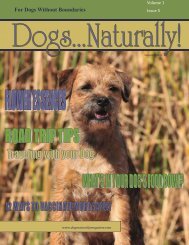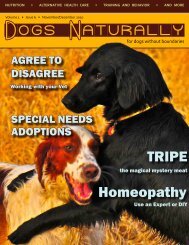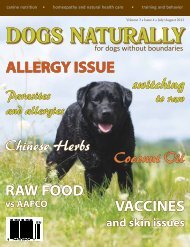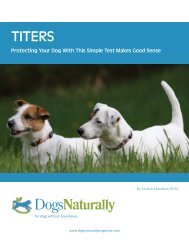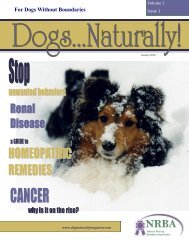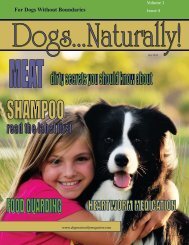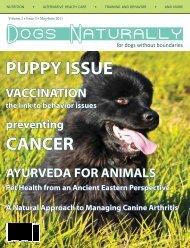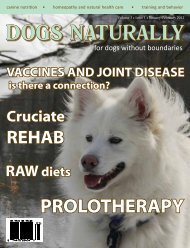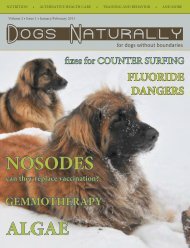Download the PDF Version - Dogs Naturally Magazine
Download the PDF Version - Dogs Naturally Magazine
Download the PDF Version - Dogs Naturally Magazine
You also want an ePaper? Increase the reach of your titles
YUMPU automatically turns print PDFs into web optimized ePapers that Google loves.
thirds meaty bones and half to one-third meats and offal (organ<br />
meats). There is no magic formula and every puppy is a bit different.<br />
Despite what <strong>the</strong> kibble manufacturers say, it’s pretty<br />
easy to balance calcium and phosphorus and <strong>the</strong>re is a wider<br />
margin of error when feeding raw. Calcium that comes in a syn<strong>the</strong>tic<br />
powder is nearly impossible for a puppy to excrete, so<br />
excesses of calcium are more of a concern with syn<strong>the</strong>tic products<br />
than with <strong>the</strong> naturally occurring calcium found in bones.<br />
My Favorite Meaty bones (50% to 65% of <strong>the</strong> diet)<br />
Turkey tails and necks<br />
Chicken backs and necks<br />
Veal ribs and tails<br />
Venison bones of any kind<br />
Muscle Meats (35% to 50% of <strong>the</strong> diet)<br />
From a variety of animals (includes heart and tongue)<br />
Offal (10% of <strong>the</strong> diet)<br />
Liver, kidneys, spleen, brain, lung<br />
Balanced foods (feed often)<br />
Eggs with shell<br />
Green tripe<br />
Whole animals (rabbit, quail, etc.)<br />
Also includes fish but this should be fed less often, due<br />
to mercury exposure<br />
Extra yummies<br />
Chicken feet and beef windpipes (good source of naturally<br />
occurring glucosamine and chondroitin)<br />
Beef neck bones (a great chew that won’t break teeth)<br />
Don’t forget <strong>the</strong> supplements<br />
Even if you’re feeding free range, organic meats, <strong>the</strong> earth is not<br />
what it used to be so your puppy will benefit from some supplementation.<br />
Supplements to consider include:<br />
Fish or krill oil (a source of Omega-3 fats which are a good idea<br />
if <strong>the</strong> meat is not grass fed)<br />
Coconut oil (antibacterial and antifungal)<br />
Nutritional herbs (alfalfa, dandelion leaf, nettle and more)<br />
Probiotics (soil based products are best and green tripe is an<br />
excellent natural source of probiotics and digestive enzymes)<br />
Bovine colostrum (helps to build a strong immune system)<br />
O<strong>the</strong>r important stuff<br />
Make sure your puppy has plenty of fresh, non-chlorinated water.<br />
He should also have plenty of fresh air and exercise. Exercise<br />
for young puppies should not be forced walks - his growing<br />
joints will suffer less stress if you take him outside for short play<br />
or training sessions instead. Keep <strong>the</strong> walks short - about five<br />
minutes per month of age until he is about six months of age.<br />
Find a mentor or raw feeding chat group<br />
You will find <strong>the</strong>re are plenty of experienced dog owners who<br />
love to help. One day, you can return <strong>the</strong> favor and help ano<strong>the</strong>r<br />
puppy owner realize how simple it is to raise puppies on<br />
raw! f<br />
Dana Scott breeds naturally reared Labrador Retrievers under<br />
<strong>the</strong> Fallriver prefix.<br />
Feed three times a day<br />
Your puppy should eat three small meals a day until he is about<br />
six months of age - <strong>the</strong>n he can eat twice a day and eventually<br />
once a day if you wish. This is especially important for small<br />
breed puppies as <strong>the</strong>y can become hypoglycemic if meals are<br />
spread out too long.<br />
Feed 2-3% of his adult body weight<br />
This is easier to determine if you have a purebred dog, but <strong>the</strong><br />
amount you feed should be 2-3% of your puppy’s anticipated<br />
adult weight. If you’re not sure what that will be, <strong>the</strong>n feed<br />
about 10% of his current weight. Watch to see if he gets too fat<br />
or too thin and adjust accordingly.<br />
Don’t overdo it with <strong>the</strong> offal<br />
Liver and o<strong>the</strong>r organ meat can cause some pretty nasty loose<br />
stools in puppies who have never had <strong>the</strong>m before. If your puppy<br />
is new to raw feeding, wait until you see a good two or more<br />
weeks of solid stools before you introduce organ meats. Then<br />
add <strong>the</strong>m in gradually instead of feeding one giant meal of liver.<br />
Don’t skip <strong>the</strong> organ meats; <strong>the</strong>y are important because <strong>the</strong>y<br />
are full of nutrients not found in muscle meat.<br />
<strong>Dogs</strong> <strong>Naturally</strong> <strong>Magazine</strong> | May/June2012<br />
23



